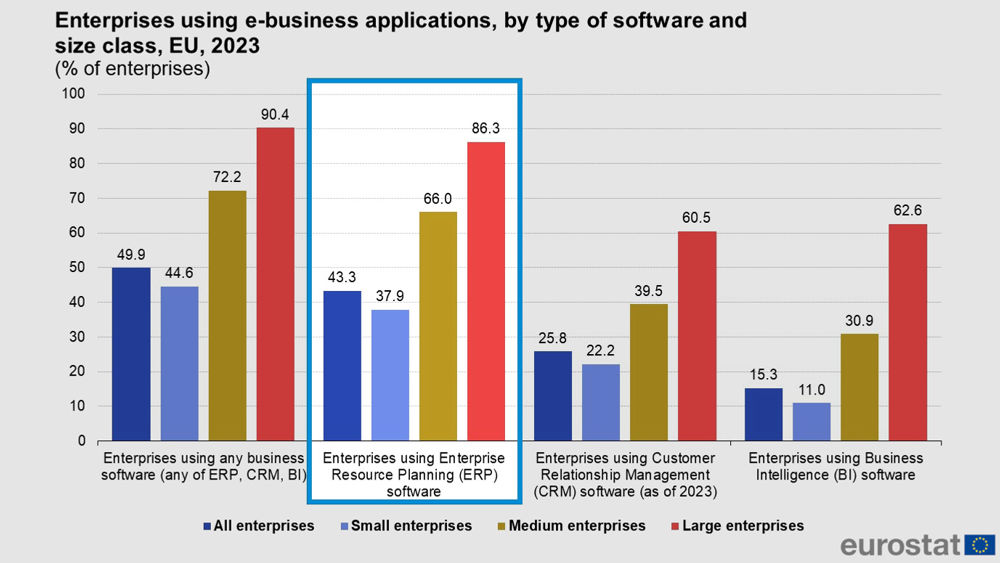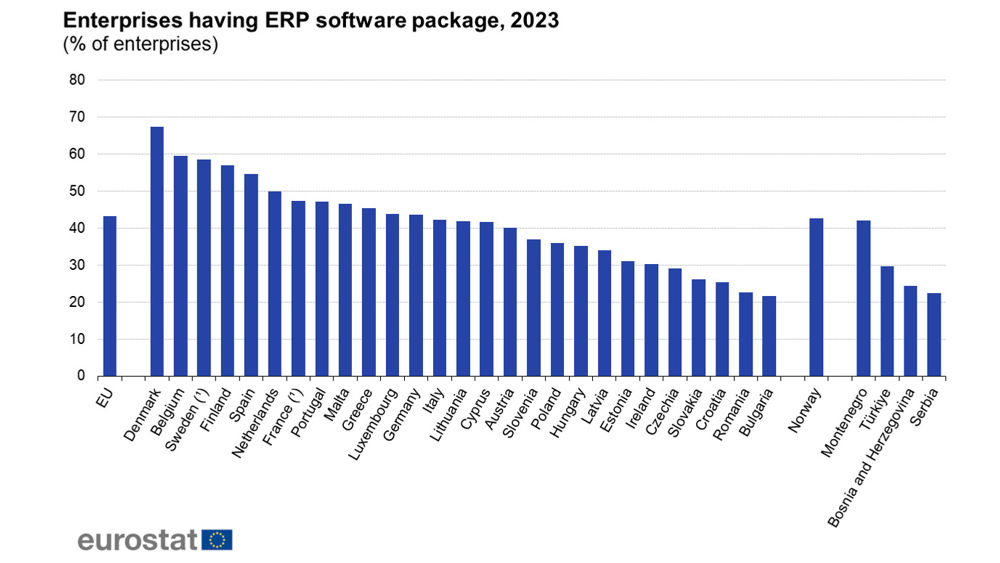Usage of ERP systems in Europe
EUROSTAT has published 2023 data on the digitization level of European companies – basing on the results of a 'EU survey on ICT usage and e-commerce in enterprises', in which statistics were obtained from enterprise surveys conducted by national statistical authorities. Among the data, there was also a place for ERP systems.
Let's take a closer look at what e-business integration looks like in the European market.
EUROSTAT defines e-business integration as the use of information and communication technologies (ICT) by enterprises to:
- run, integrate and improve their business processes,
- share and exchange information internally,
- analyse data or communicate with business partners and customers.
The sharing and exchange of information electronically and automatically between different business functions within the enterprise is implemented using software applications for enterprise resource planning (ERP). It further states that the integration and management of the communitarian with customers is implemented by the use of customer relationship management (CRM) applications, and the analysis of data from internal and external sources and the presentation of the findings in reports, graphs, charts and maps with the aim to provide users with insights for decision-making and strategic planning is done with Business Intelligence (BI) software.*
The percentage of companies using ERP systems in the European Union continues to grow
Nowadays more than 43,3% of all enterprises are already using ERP systems. Their percentage, however, varies greatly depending on the size of the company. The share of small enterprises (up to 49 employees) using ERP software is 37.9 % – two times lower than 66% recorded for medium companies (50-249 employees) and more than two and half times lower than the percentage for largest enterprises (over 250 employees), where the counter stopped at 86,3 %:

Enterprises using e-business applications, by type of software and size class | Source: Eurostat
This indicates a continuing need to raise awareness of the need for an ERP system and to highlight the opportunities for process optimization and profitability that this fact brings - particularly among the smallest companies.
Unequal percentage share of each country within EU
Although ERP system has proven to be the most popular among solutions supporting e-business development, its usage varies significantly from country to country. In just five countries, more than 50% of all companies use ERP systems - leading the way here are: Denmark, Belgium, Sweden, Finland and Spain. On the other hand, many still-developing countries have up to this time largely not implemented ERP in their operations:

Enterprises having ERP software package | Source: Eurostat
How can Monitor ERP affect these statistics and help companies to improve?
Bearing in mind what was written in the introduction of this article, that is, the overarching goals of e-business integration based on the use of information to run, integrate and improve their business processes, share and exchange information internally and analyse data or communicate with business partners and customers - it becomes clear that Monitor ERP can help achieve these goals.
Monitor ERP has been developed through a strong commitment to help manufacturing companies reach their full potential by optimizing their processes. It is perfectly tailored and dedicated to manufacturing companies, especially small and medium-sized enterprises, which, according to the data presented, still largely lack a suitable ERP system.
The fact that Monitor ERP is a standard system significantly affects the cost and time of implementation, by avoiding costly and time-consuming customizations, being optimized and ready to use. With its functional scope Monitor covers all processes of a manufacturing company, leading to structuring and automation of processes and consequently - increasing profitability and customer satisfaction.
Why Monitor ERP?
Monitor ERP ensures you have the integrated vision you need in every area of your business. You’ll have full control over your process and workflows, pure and simple. Your company will gain a comprehensive management and business decision support system.
You’ll also find it easier to honor your commitments – and that’s a promise.
Less administration
Automate processes – let the system do the work for you

Make the right decisions
Focus on the products that actually make money

Traceability
Keep track of the whole business process

Daily management
Get a clear overview with current data and information

Deliver on time
Honor your commitments for more satisfied customers

Reduce stock
Material planning that ensures cost-efficient storage

Standard ERP System
Experience the power of standardization for manufacturing!
Monitor ERP is a standardized system, which means it is already optimized for manufacturing companies. This fact brings many benefits, such as:
✓ Complete, ready-to-go ERP system
✓ Quick to get up and running
✓ No adjustments are necessary
✓ Configure the system with system settings, incorporated document editor, BI-editor, and customized reports
✓ Speedy support
✓ Optional extras for extended functionality
✓ API for integration with other systems
Every company is unique, but there are many common challenges, ways of working and business areas specific to the manufacturing industry. An ERP system should therefore meet the requirements and criteria of this sector. That's what Monitor ERP does – it is created specifically for manufacturing.
Quick to get up and running
A standard ERP system allows for less time-consuming implementation and quicker proceeding due to the lack of additional adaptations and adjustments.

Lower implementation costs
Avoiding time-consuming adaptations and adjustments also saves costs resulting from the investment in the ERP system.

No customizations needed
Costly adaptations are not necessary for the system to function. This results in lower costs.

Speedy support
The standardization of the system allows for instant help from the support department and effective advice from consultants.

Regular updates
With Monitor ERP you always work with the latest version of the system and updates take place regularly improving security and functionality.

The power of customer voice
By becoming a Monitor customer, of which there are already more than 5,500, you have the opportunity to share your opinion and ideas, which often turn into new features.



